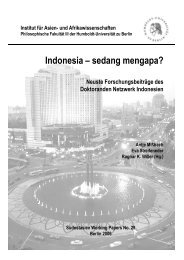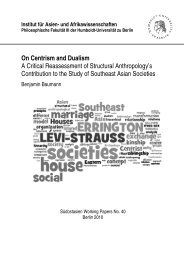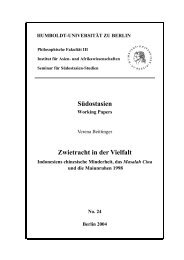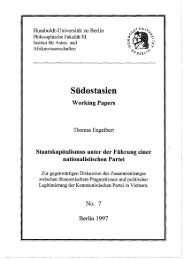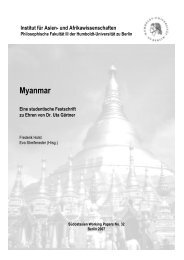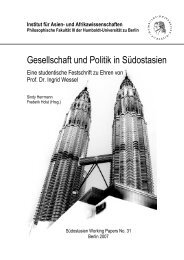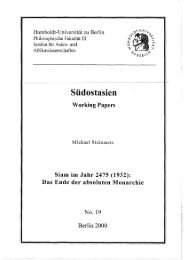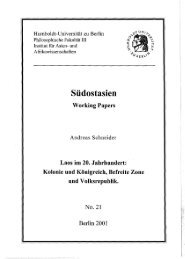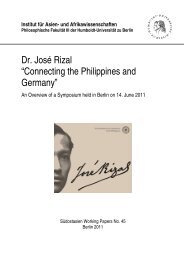support of some elements in the armed forces. 144 Rivalries between the army, the jihad forces and thepolice were frequently reported. In June 2000, Laskar Jihad fighters broke into the local police headquartersin Ambon, stealing ammunition, weapons and police uniforms and burned down housingsoccupied by police members and their families. 145Megawati’s Rise to the Presidency and the Peace Agreement for MalukuBy the end of 2000, efforts to restrain and repel Laskar Jihad by less sympathetic elements in thearmed forces were led by a joint battalion under the command of the newly appointed Balinese Hindugeneral and later by the Special Forces (KOPASSUS) troops. These efforts, which included well-publicizedincidents of torture and summary executions of Laskar Jihad members, contributed to a markeddecline in Muslim violence against Christian neighbourhoods and villages in Maluku. 146The year 2001 marked the defeat of Islamists in Jakarta. The religious parties successfully removedWahid from his presidency, but failed to prevent the election of Megawati to succeed him. Her positionas vice-president and the strength of her party’s contingent in parliament as well as her closeconnections to elements in the military establishment ensured her eventual replacement of Wahid inJuly 2001. 147 Subsequently, parliamentarians of the Muslim party coalition bandwagoned and acceptedministerial positions in Megawati’s cabinet. 148 Thus, the limits of Islamist politics became apparent andIslamist parties gave up their efforts to insert key phrases about Islamic law into the constitution.Megawati was able to pursue the kind of ecumenical, secular nationalist agenda with which the PDIPhad long been identified. 149After 11 September, 2001 international attention and pressure on the Indonesian government to takeaction against the Laskar Jihad increased. The months following Megawati’s presidency witnessed asuccessful crackdown on Laskar Jihad by the security forces, leading to its forced demobilization andvirtual disappearance from Maluku by early 2002. 150 Government mediators once again broughttogether Muslims and Christians with the result of a final peace. The “Malino II” agreement wasgreeted with euphoria in Ambon’s streets. 151 However, it was soon followed by intermittent explosionsand attacks which many suspected to have been orchestrated by those who profited from the perpetuationof chronic low-scale violence: segments of the military and police, individual deserters from thesame, local gangsters, militant groups and others. 152 Ambon city remained largely divided into religioussegments, with “pools of resentment and bitterness” alongside emerging neutral zones ofpeace. 153 Laskar Jihad was formerly disbanded in October 2002. Sporadic violence continued, but thesituation became gradually less violent.144 Sidel, Riots, Progroms, Jihad, 198.145 Aditjondro, Guns, Pamphlets, Handie-Talkies, 117.146 Sidel, Riots, Progroms, Jihad, 198.147 Sidel, Riots, Progroms, Jihad, 212.148 Sidel, Riots, Progroms, Jihad, 213.149 Sidel, Riots, Progroms, Jihad, 213.150 Sidel, Riots, Progroms, Jihad, 199.151 Spyer, Fire without Smoke, 6.152 ICG, Overcoming Murder and Chaos in Maluku.153 Spyer, Fire without Smoke, 6.32
Challenging the Interpretation of “Religious Violence”I have identified two key factors responsible for conflict escalation in Maluku: agency on the nationallevel, where actors instrumentalized the violence to undermine the reform government, and agency onthe local level where receptiveness for violence and the religious cleavage existed and residents partookin riots. In addition, religious actors, semi-independent from national politicians and the localpopulation, cultivated a discourse conducive to the construction and the instrumentalization of themaster cleavage of “religious violence”. The local discourse was clearly linked to the frames alreadyemployed in Jakarta during the last years of Suharto’s reign. The fighting in Ambon was easily connectedto the conspiracy against Muslims driven by Indonesian Christians, Chinese and Westerninstitutions, the lack of “Muslim proportionalism”, and a new government that did not appear toexplicitly protect the interests of Muslims, but enjoyed support among Christians. The strategy ofemploying internationally recognized terms of religious identity marks the gradual abstraction of theoriginal context conditions towards a general national conflict with international implications.Once the narrative of religious violence became widely accepted, the conflict was shifted to a newlevel of violence with starkly rising casualty figures when Laskar Jihad fighters arrived in Maluku.The successful construction of the label ‘religious violence’ and its linkage to the national power struggleand local existing tensions enabled national actors to orchestrate repeated attacks and voicepolitical claims based on the ongoing violence. The local adoption of the cleavage and the silenceamong some religious actors if not outright support for this interpretation enabled the mastermindersof violence to camouflage their actions.In conclusion, labelling the Maluku violence as ‘religious’ does neither account for the fact that beforeviolence broke out, several cleavages and tensions existed, nor for the observation that the migrantpopulation was overwhelmingly targeted during the first weeks of violence, thus implying othermotives than religious fervour. It neither accounts for the fact that much violence was orchestrated byexternal riot-leaders and later fulltime external jihad fighters, nor for the documented sniper attacks ofthe security forces who killed both Muslims and Christians with head shots and kept conflict simmering.Rather, the interpretation refers to the power struggle that dominated Jakarta politics during andafter the transition and is indirectly linked to the debate of what Indonesian Islam is and how it shouldbe represented politically.The rise of Megawati to the presidency marked the defeat of conservative Islamist politics in Jakarta.Thus, the legacy of the religiously-inspired pro-democracy movement in Indonesia is impressive.Eight years after Reformasi, 85.9% percent of Muslim educators agree that “democracy is the bestform of government for Indonesia”. 154 Noorhaidi Hasan commented in 2002 that “political Islamremains on the political periphery, and may never succeed in changing the strategic landscape of theMuslim world”. 155 In this view, Indonesia stands as a remarkable success for an islamically- inspiredand supported democratic system. Yet, the situation also remains ambivalent. The same survey onMuslim educators view on democracy also documents that 72.2 percent of educators also believe “thatthe state should be based on the Qur’an and Sunnah (..) and guided by religious experts”. 156 Thisreveals that while the Muslim population is strongly committed to values such as democracy and liberalrights, they hold by no means a secularist liberal attitude. The challenge of institutionalarrangements for these ambivalences and possible contradictions is precisely the background againstwhich Muslim politics may indirectly - and in view of radical Islamist groups, directly - facilitate154 Hefner, Making Democracy Work Islamically, 2.155 Hasan, Faith and Politics, 169.156 Hefner Making Democracy Work Islamically, 2.33
- Seite 1: Institut für Asien- und Afrikawiss
- Seite 4 und 5: SÜDOSTASIEN Working PapersISSN: 14
- Seite 7: VorwortBoryano Rickum und Eva Strei
- Seite 10 und 11: Theoretischer Zugang: Waldschutzkon
- Seite 12 und 13: Zum anderen ist ein weiteres Proble
- Seite 14 und 15: verbleiben die Landrechte beim Staa
- Seite 16 und 17: Dutschke, Michael/Wolf, Reinhard (2
- Seite 18 und 19: Many commentators perceive religion
- Seite 20 und 21: in Maluku was “basically not a re
- Seite 22 und 23: around Wahid’s NU, Megawati’s n
- Seite 24 und 25: groups were uniting against Suharto
- Seite 26 und 27: end to the military’s political r
- Seite 28 und 29: January 20, the second day of viole
- Seite 30 und 31: When violence broke out in Maluku i
- Seite 32 und 33: children, were burned to death in t
- Seite 36 und 37: interpretations and instrumentaliza
- Seite 38 und 39: Soei Liong, Liem (2002) It’s the
- Seite 40 und 41: Malaysia) war einer der wichtigsten
- Seite 42 und 43: Rückkehr und ReintegrationBereits
- Seite 44 und 45: NGO-Aktivist. Beide Kandidaten hatt
- Seite 46 und 47: Gastland. Darüber hinaus finden wi
- Seite 48 und 49: tergehen. Die Unterzeichner und Her
- Seite 51 und 52: 4 Remembering the dark: The Japanes
- Seite 53 und 54: le for the creation of certain iden
- Seite 55 und 56: Remembering and forgettingWith thes
- Seite 57 und 58: These fragments of the social memor
- Seite 59 und 60: The policy of remembrance’s diffe
- Seite 61 und 62: ConclusionThe task of this essay wa
- Seite 63 und 64: 5 Euro-asiatische Kindheit im Batav
- Seite 65 und 66: mal 25 Jahre einschließen. Im Zent
- Seite 67 und 68: erzogen, lässt sich nicht verallge
- Seite 69 und 70: Formale Voraussetzungen für eine e
- Seite 71 und 72: Frau. Eine Frau durfte nie Vormund
- Seite 73 und 74: Lebenshaltungskosten in Batavia war
- Seite 75 und 76: Die fehlende Zuwendung des Vaters z
- Seite 77 und 78: angelegt wurde, so z.B. zum Kirchga
- Seite 79 und 80: ihrem Ehemann Joan van Hoorn an ihr
- Seite 81 und 82: icht teilnehmen. Die Sorge um die K
- Seite 83 und 84: asiatischen Familien und zum andere
- Seite 85 und 86:
Niederländer schickten ihre Kinder
- Seite 87 und 88:
Dies wurde allerdings verzeichnet,
- Seite 89 und 90:
Die meisten der Mischlingskinder wu
- Seite 91 und 92:
über das private Zusammenleben inn
- Seite 93 und 94:
Internetquellenhttp://hadith.al-isl
- Seite 95 und 96:
6 Freundschaft als soziale Praxis:i
- Seite 97 und 98:
laritäten und Überlagerungen mit
- Seite 99 und 100:
seiner Funktion auf individueller u
- Seite 101 und 102:
zunächst grob die wichtigsten sozi
- Seite 103 und 104:
Freundschaften „indonesisch“ od
- Seite 105 und 106:
Die Sphären lokalkulturell (javani
- Seite 107:
Haller Dieter (2001) Entwurf einer
- Seite 110 und 111:
Die Dia’ang betreiben als Bauern
- Seite 112 und 113:
tragen werden würde, die hier vorb
- Seite 114 und 115:
den traditionellen Schutz- und Gege
- Seite 117:
Über die AutorInnenNicola Borchard
- Seite 120:
22. Heinz Schütte (2003) Hundred F



